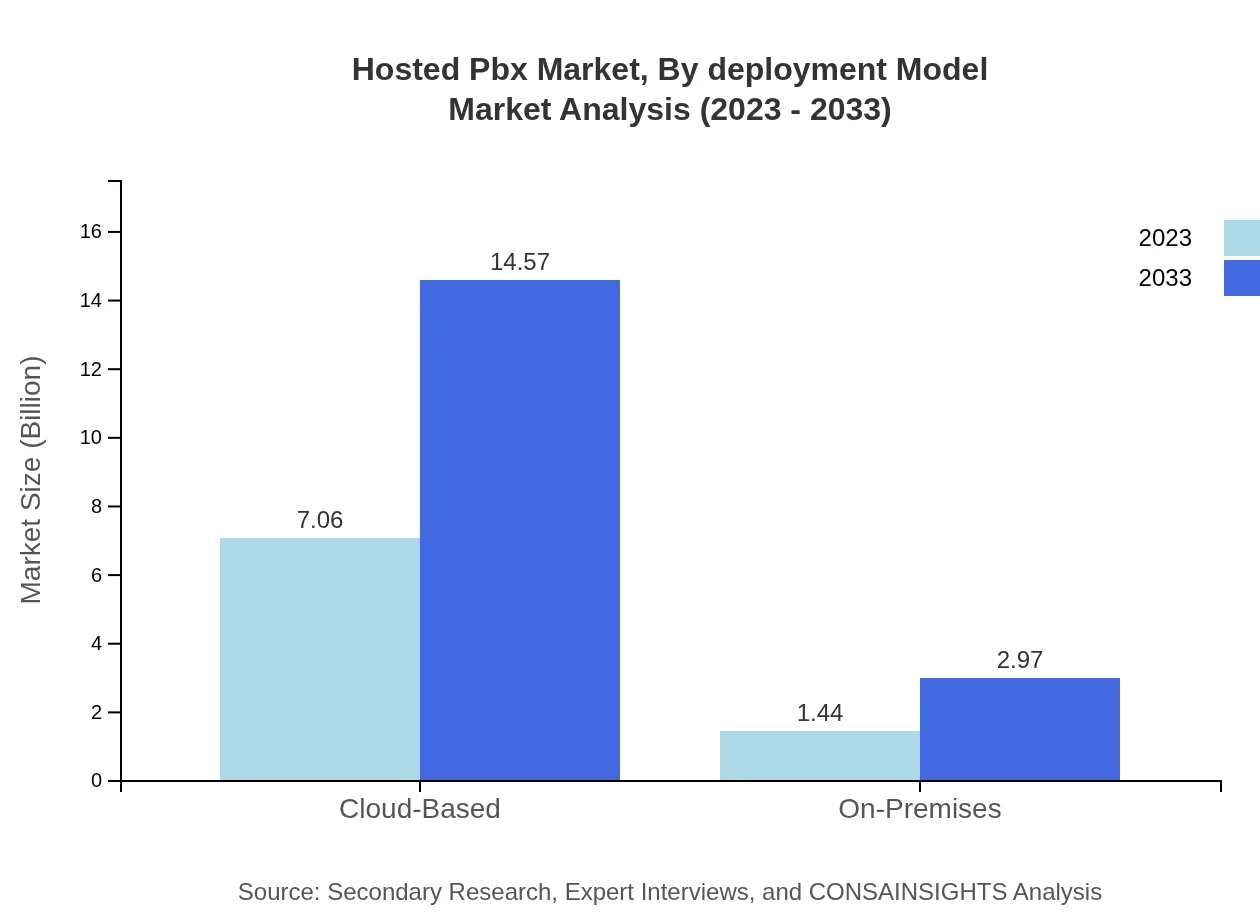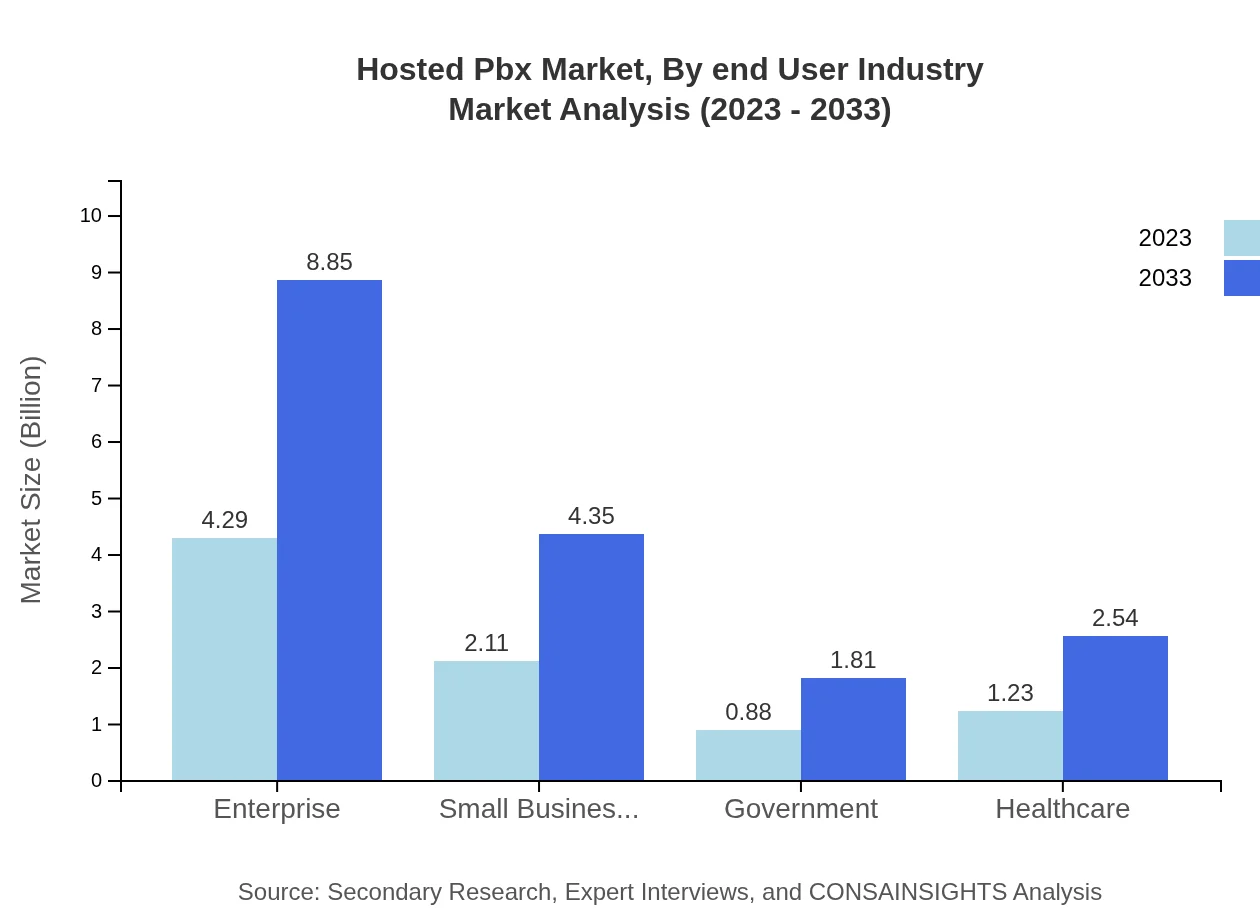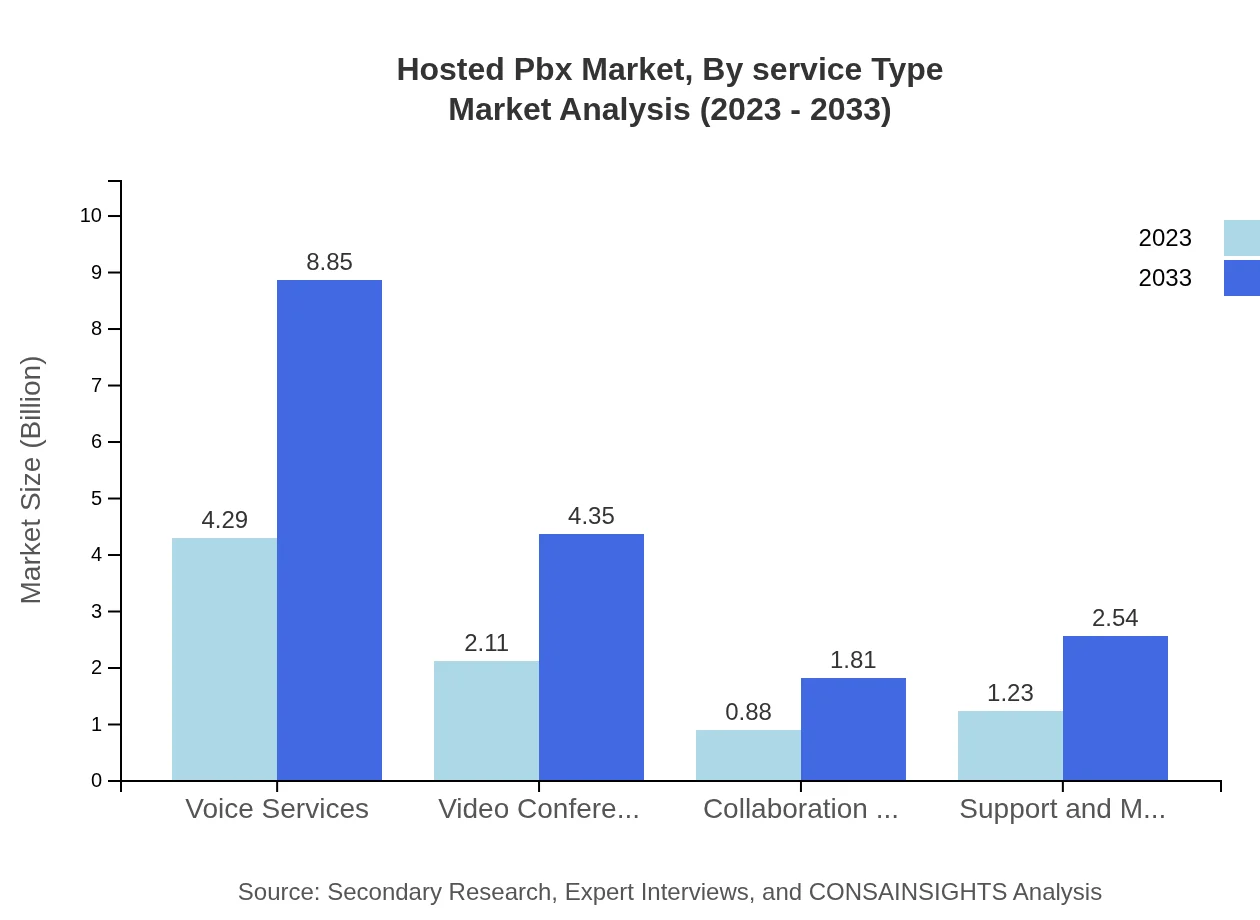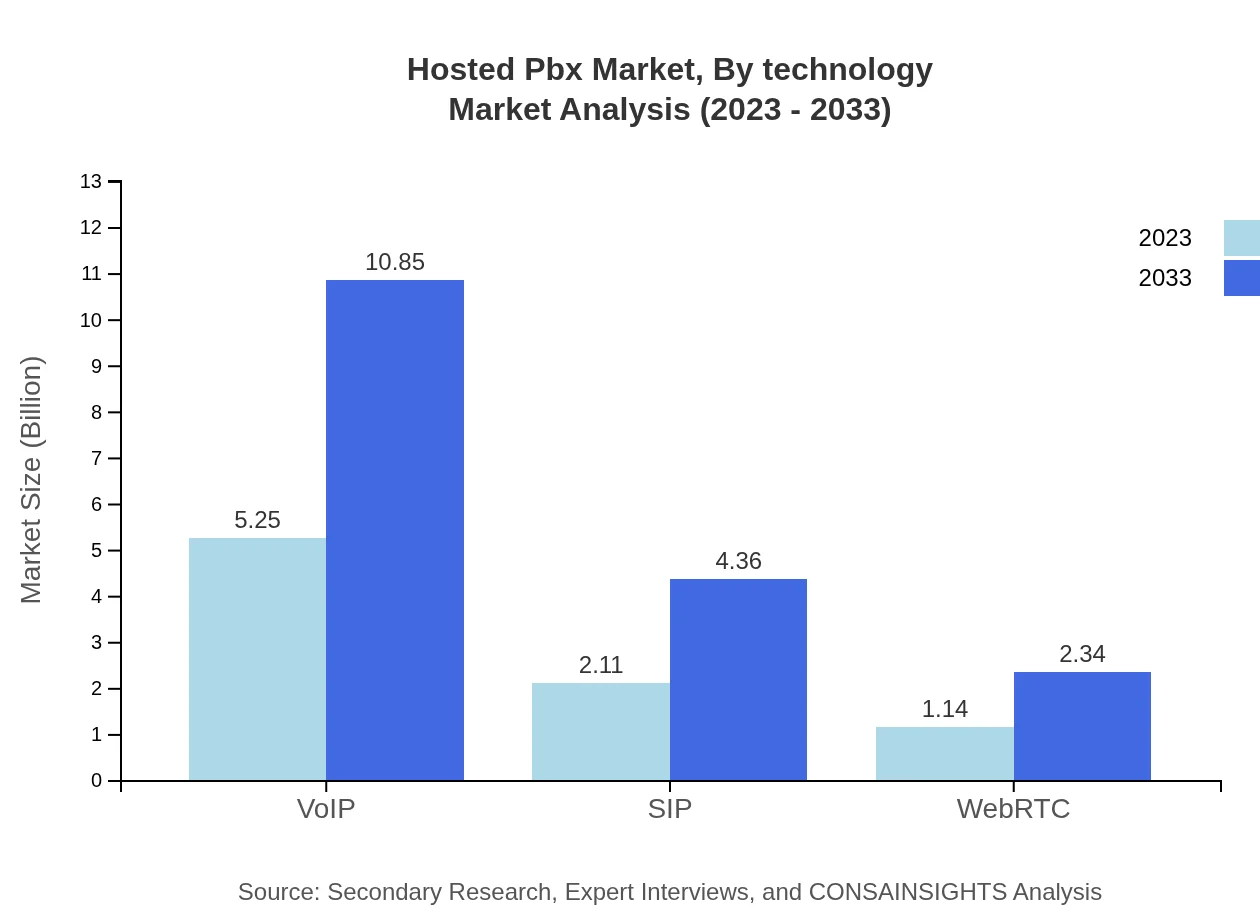Hosted Pbx Market Report
Published Date: 31 January 2026 | Report Code: hosted-pbx
Hosted Pbx Market Size, Share, Industry Trends and Forecast to 2033
This report provides a comprehensive analysis of the Hosted PBX market from 2023 to 2033, including market trends, growth forecasts, and competitive landscape insights. It aims to deliver valuable information for stakeholders interested in understanding market dynamics and opportunities within this sector.
| Metric | Value |
|---|---|
| Study Period | 2023 - 2033 |
| 2023 Market Size | $8.50 Billion |
| CAGR (2023-2033) | 7.3% |
| 2033 Market Size | $17.55 Billion |
| Top Companies | RingCentral, 8x8, Inc., Vonage, Nextiva, Dialpad |
| Last Modified Date | 31 January 2026 |
Hosted Pbx Market Overview
Customize Hosted Pbx Market Report market research report
- ✔ Get in-depth analysis of Hosted Pbx market size, growth, and forecasts.
- ✔ Understand Hosted Pbx's regional dynamics and industry-specific trends.
- ✔ Identify potential applications, end-user demand, and growth segments in Hosted Pbx
What is the Market Size & CAGR of Hosted Pbx market in 2023?
Hosted Pbx Industry Analysis
Hosted Pbx Market Segmentation and Scope
Tell us your focus area and get a customized research report.
Hosted Pbx Market Analysis Report by Region
Europe Hosted Pbx Market Report:
The European market is set to grow from $2.08 billion in 2023 to $4.30 billion by 2033. Factors influencing this growth include stringent regulations promoting digital transformation and the increased emphasis on remote work solutions post-COVID-19.Asia Pacific Hosted Pbx Market Report:
The Asia Pacific region is expected to experience significant growth in the Hosted PBX market, reaching approximately $3.51 billion by 2033, up from $1.70 billion in 2023. This growth is attributed to the rise of SMEs and increasing remote working trends, alongside substantial investments in telecommunications infrastructure across countries like India and China.North America Hosted Pbx Market Report:
The North American region dominates the Hosted PBX market, with revenues expected to reach $6.28 billion in 2033 from $3.04 billion in 2023. This is largely due to the strong presence of major telecommunications companies and a rapid shift to cloud-based solutions coupled with high adoption of advanced technologies like AI and automation.South America Hosted Pbx Market Report:
In South America, the market is projected to grow from $0.62 billion in 2023 to $1.29 billion by 2033. This growth is driven by increasing demand for efficient communication systems among local businesses and the expansion of internet connectivity in urban areas.Middle East & Africa Hosted Pbx Market Report:
The region of Middle East and Africa will see a rise from $1.05 billion in 2023 to $2.16 billion by 2033. Growth in this area can be attributed to increasing mobile networks and internet penetration, combined with the expanding corporate sector looking for efficient communication solutions.Tell us your focus area and get a customized research report.
Hosted Pbx Market Analysis By Deployment Model
The Hosted PBX market by deployment model includes Cloud-based and On-Premises solutions. Cloud-based solutions dominate the market, expected to reach $14.57 billion by 2033, accounting for 83.06% market share, as businesses seek flexible and scalable communication solutions. On-Premises deployments, while lesser in demand, are anticipated to grow to $2.97 billion with a market share of 16.94% by 2033.
Hosted Pbx Market Analysis By End User Industry
The end-user industry segmentation encompasses Enterprises, Small Businesses, Governments, and Healthcare sectors. The enterprise segment leads with an expected market size of $8.85 billion by 2033, which represents a 50.43% share. Small businesses are projected to grow to $4.35 billion, while the healthcare sector holds a significant market share expected to reach $2.54 billion by 2033.
Hosted Pbx Market Analysis By Service Type
In terms of service type, the market includes Voice Services, Video Conferencing, Collaboration Tools, and Support and Maintenance. Voice Services holds the largest segment, projected to reach $8.85 billion by 2033. Video Conferencing and Collaboration Tools are also critical segments, continuing to grow in importance especially among remote working teams.
Hosted Pbx Market Analysis By Technology
Technologies shaping the Hosted PBX market include VoIP, SIP, and WebRTC. VoIP is the dominant technology, expected to reach a market size of $10.85 billion by 2033 with a share of 61.81%. SIP and WebRTC will also grow, projected to reach $4.36 billion and $2.34 billion respectively, indicating a robust shift towards more adaptable and integrated communication solutions.
Hosted Pbx Market Trends and Future Forecast
Tell us your focus area and get a customized research report.
Global Market Leaders and Top Companies in Hosted Pbx Industry
RingCentral:
RingCentral is a prominent cloud communications provider offering a comprehensive suite of solutions for businesses, including hosted PBX services that enhance enterprise collaboration and productivity.8x8, Inc.:
8x8, Inc. offers voice, video, and chat solutions along with its hosted PBX services, focusing on delivering a competitive edge with its robust technology and client-focused offerings.Vonage:
Vonage provides innovative cloud communications and hosted PBX services for businesses of all sizes, emphasizing flexibility and cost-effectiveness through its VoIP technology.Nextiva:
Nextiva specializes in VoIP communication services and hosted PBX solutions, known for its exceptional customer service and innovative communications platform.Dialpad:
Dialpad combines advanced AI capabilities with its cloud communication solutions, enhancing hosted PBX functionality tailored for modern businesses.We're grateful to work with incredible clients.









FAQs
What is the market size of hosted Pbx?
The global hosted PBX market is valued at $8.5 billion in 2023 and is projected to grow at a CAGR of 7.3%, reaching significant growth by 2033.
What are the key market players or companies in the hosted Pbx industry?
Key players in the hosted PBX market include industry leaders and innovative startups offering diverse services catered to varying business sizes.
What are the primary factors driving the growth in the hosted Pbx industry?
Factors driving growth include increased adoption of cloud-based solutions, demand for cost-effective communication systems, and the rise of remote work solutions among businesses.
Which region is the fastest Growing in the hosted Pbx?
Asia Pacific is expected to showcase rapid growth in the hosted PBX sector, with its market size projected to increase from $1.70 billion in 2023 to $3.51 billion by 2033.
Does ConsaInsights provide customized market report data for the hosted Pbx industry?
Yes, ConsaInsights offers tailored market report data that can be customized to meet the specific insights and requirements of clients in the hosted PBX industry.
What deliverables can I expect from this hosted Pbx market research project?
The research deliverables include comprehensive reports detailing market trends, forecasts, competitive analysis, and tailored insights into specific segments of the hosted PBX market.
What are the market trends of hosted Pbx?
Key trends include the shift towards cloud-based solutions, integration with mobile communications, and increased focus on customer service improvements through advanced PBX functionalities.





